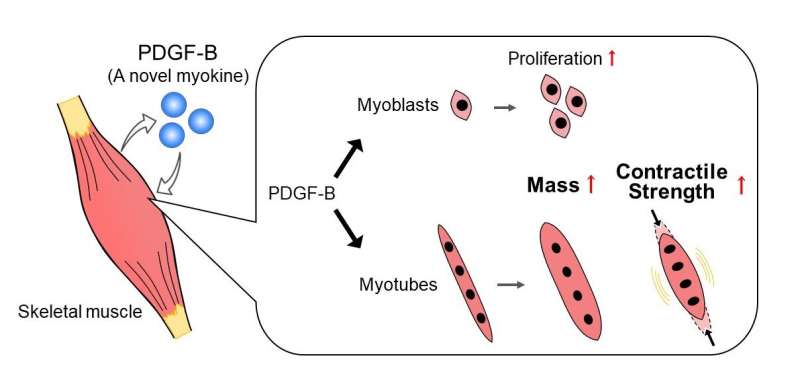PDGF-B secreted from skeletal muscle cells enhances not only cell proliferation but also muscle hypertrophy accompanied by contractile function. Credit: Tokyo Metropolitan University
Scientists from Tokyo Metropolitan University have discovered that a protein called platelet-derived growth factor subunit B (PDGF-B) is continuously secreted from skeletal muscle cells and helps to repair muscles by encouraging myoblasts (muscle stem cells) to proliferate. Unexpectedly, they found that PDGF-B also helps muscle fibers grow. They confirmed this corresponded to fibers contracting more strongly. Their findings promise game-changing therapies for treating muscular atrophy and injury.
Myokines are small proteins secreted by skeletal muscle cells. They have a wide range of functions and may act on cells both near and far to where they are made. A comprehensive picture of how myokines affect cellular processes is far from clear, but it is believed that they play an important role in exercise-related bodily functions, particularly the maintenance of muscle tissue.
A team led by Associate Professor Yasuko Manabe at Tokyo Metropolitan University has been studying how myokines affect the behavior of muscle cells. Through extensive experiments, they found that a myokine known as platelet-derived growth factor subunit B, or PDGF-B, is secreted by skeletal muscles in a constitutive way (i.e., without any stimulus). To understand what role it plays, they took myoblasts, precursor cells which go on to differentiate into muscle fibers, and exposed them to PDGF-B. They were able to clearly show that PDGF-B induced greater proliferation of myoblasts.
Curiously, they also found that PDGF-B impacted cells which had already differentiated. They took myotubes, a developmental stage of muscle fibers, and exposed them to the same myokine. Myotubes treated in this way exhibited significantly more maturation, visibly increasing in diameter under microscope observation. They also expressed more Myosin Heavy Chain, a key part of the protein structure of myosin, the molecular motor responsible for muscle contraction.
Using a recently developed technique based on observing how myotubes react to an electric pulse, this was shown to directly correspond to increased contractile strength. Thus, PDGF-B not only helps make more muscle, but makes them stronger. But this doesn't mean both processes are accelerated in a haphazard manner. They noticed subtle differences in PDGF-B signaling pathways between myotubes and myoblasts; the team believe these differences may be involved in cells switching from a proliferating phase to one where they are maturing.
The paper is published in the journal Biochemical and Biophysical Research Communications.
The team's work shows clearly that PDGF-B is involved in muscle regeneration and constitutes a big leap forward for developing effective treatments for muscle injury and atrophy as well as regimens for improving muscle performance.
More information: Hiroki Hamaguchi et al, PDGF-B secreted from skeletal muscle enhances myoblast proliferation and myotube maturation via activation of the PDGFR signaling cascade, Biochemical and Biophysical Research Communications (2022). DOI: 10.1016/j.bbrc.2022.11.085
Journal information: Biochemical and Biophysical Research Communications
Provided by Tokyo Metropolitan University
























